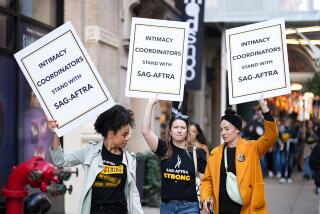No. 2 actors union set for prime-time talks
- Share via
Labor negotiations could begin as early as this week between Hollywood’s major studios and the smaller of the two unions that represent actors.
The move could set the stage for a new prime-time TV contract for members of the American Federation of Television and Radio Artists, which is anxious to avoid a showdown with the studios that could trigger another Hollywood strike. This weekend AFTRA broke with sister union the Screen Actors Guild, with whom it has jointly bargained for 27 years, alleging a continuing campaign to marginalize the smaller guild.
“We’ve begun the process and let the studios know we’re ready to negotiate,” AFTRA President Roberta Reardon said.
That’s welcome news to the Alliance of Motion Picture and Television Producers, which negotiates on behalf of the studios. The group said it was “pleased to learn that AFTRA is also ready to begin talks immediately.”
Officials from the alliance and AFTRA said Sunday that no date had been set. But both indicated that talks would begin promptly.
A preemptive deal by AFTRA with the studios could weaken the hand of SAG. A major issue for the dominant actors union is to push for higher residuals from new media and a larger cut of revenue from DVDs. The studios have said DVD revenue is not up for discussion. Whether putting the matter on the table is a bargaining ploy or a strike issue is unclear, but SAG leaders have been talking tough.
“Unions don’t cause strikes to happen,” said Doug Allen, SAG’s chief negotiator and executive director. “Strikes happen when management is unreasonable and intransigent and there’s no other option. We’ll see what happens at the bargaining table.”
If AFTRA reaches a contract agreement with the studios before SAG, then the larger guild may find itself in a predicament similar to the one that writers found themselves in earlier this year.
In a deft strategic maneuver, the studios quickly negotiated a new contract with the directors while writers were on picket lines. That contract served as the model for the subsequent writers deal. And despite a three-month strike and its cost in lost jobs and wages, the writers won little more.
Allen said he plans to contact the studio’s chief negotiator, Nick Counter, today to set a date for talks. He said SAG would have preferred to negotiate with AFTRA because “unions that stick together have more leverage than unions that are divided.”
Nonetheless, Allen said his goal remained “to get the best possible contract that addresses the issues that concern working actors.”
The constant infighting between SAG and AFTRA is upsetting to some union officials and many members, who say they have a tough enough time making a living as working actors. Some 90% of SAG’s 120,000 members earn less than $10,000 a year from acting.
“The idea of us now having to negotiate against ourselves is very awkward,” said Mike Pniewski, president of SAG’s Georgia branch. “I think of us as actors, not union members . . . we just want a contract that gives us residuals, access to benefits and protections to look out for our interests.”
Veteran actress Frances Fisher, who played Kate Winslet’s mother in the 1997 megahit “Titanic” and sits on both SAG and AFTRA’s national boards, believes the unions’ divorce plays right into the studios’ hands and hurts SAG’s leverage.
“The AMPTP is very happy about this,” Fisher said. “AFTRA is going to go in and make a worse deal than if SAG was there because traditionally they’ve made deals in [cable television] that have undercut SAG. Do you think they’re going to fight any harder in prime time?”
--
More to Read
The biggest entertainment stories
Get our big stories about Hollywood, film, television, music, arts, culture and more right in your inbox as soon as they publish.
You may occasionally receive promotional content from the Los Angeles Times.










